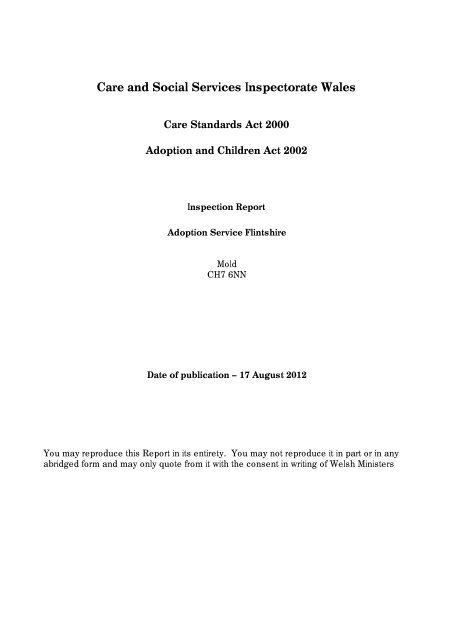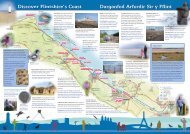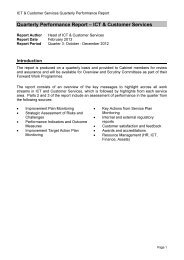Enc. 3 for North Wales Adoption Service, item 33 PDF 50 KB
Enc. 3 for North Wales Adoption Service, item 33 PDF 50 KB
Enc. 3 for North Wales Adoption Service, item 33 PDF 50 KB
Create successful ePaper yourself
Turn your PDF publications into a flip-book with our unique Google optimized e-Paper software.
Care and Social <strong>Service</strong>s Inspectorate <strong>Wales</strong><br />
Care Standards Act 2000<br />
<strong>Adoption</strong> and Children Act 2002<br />
Inspection Report<br />
<strong>Adoption</strong> <strong>Service</strong> Flintshire<br />
Mold<br />
CH7 6NN<br />
Date of publication – 17 August 2012<br />
You may reproduce this Report in its entirety. You may not reproduce it in part or in any<br />
abridged <strong>for</strong>m and may only quote from it with the consent in writing of Welsh Ministers
Introduction<br />
In 2010 all six <strong>North</strong> <strong>Wales</strong> local authorities established, under a partnership agreement,<br />
a single adoption service <strong>for</strong> <strong>North</strong> <strong>Wales</strong>. Flintshire County Council adoption agency<br />
has there<strong>for</strong>e, whilst retaining legal responsibility <strong>for</strong> their adoption agency and service,<br />
delegated responsibility <strong>for</strong> managing the day to day operation of the service to The<br />
<strong>North</strong> <strong>Wales</strong> <strong>Adoption</strong> <strong>Service</strong> (NWAS). The manager of NWAS is Mandy Humphries.<br />
Two adoption social workers are employed by and accommodated within the offices of<br />
Flintshire County Council. NWAS has an office in Wrexham.<br />
NWAS provides services to prospective and approved adopters, to birth parents and<br />
to people who have been adopted and their wider family members. A contract is in place<br />
with After <strong>Adoption</strong> <strong>for</strong> intermediary services to be provided. A contact service is<br />
provided to arrange and monitor the direct and indirect contact arrangements that<br />
have been agreed <strong>for</strong> adopted children. Prospective adopters who seek an<br />
adoption with a <strong>for</strong>eign element are referred by NWAS to an agency that specialises in<br />
such work.<br />
Inspection methods<br />
Local authority adoption services are inspected once every three years. The inspection<br />
of this service, which was a scheduled, announced inspection, started on 8 May 2012<br />
and was carried out by two inspectors. A pre-inspection meeting was held with the<br />
manager of NWAS and a social work manager. The inspection activity extended over a<br />
period of three weeks to enable visits to be made to adoptive parents and <strong>for</strong> feedback<br />
to Flintshire and NWAS.<br />
Evidence was gathered through the Self Assessment of <strong>Service</strong> (SAS) submitted be<strong>for</strong>e<br />
the inspection and from questionnaires returned by adopters and staff. Discussions were<br />
held with the NWAS manager, staff from the adoption team, with looked after children<br />
(LAC) team members and with three adopters who were visited in their homes. Meetings<br />
were held with the operations manager and head of service <strong>for</strong> Flintshire. A selection of<br />
children’s adoption files and those of their adopters were assessed, as were the files of<br />
staff and files of the After <strong>Adoption</strong> service. The archive storage of adoption files was<br />
examined. The inspectors were provided with a range of documents that related to the<br />
service, including the current policies and procedures.<br />
Summary of inspection findings<br />
What does the service do well?<br />
<br />
<br />
<br />
<br />
<br />
<br />
The in<strong>for</strong>mation on adoption on the NWAS website, accessed via the Flintshire<br />
County Council website, is comprehensive and clear.<br />
There is a diversity of adopters and an increased ability of the service to place<br />
children in <strong>North</strong> <strong>Wales</strong><br />
The assessments of prospective adopters have become more analytical.<br />
To respond to the increased workload the service has employed sessional / fee<br />
paid staff.<br />
There are very useful and in<strong>for</strong>mative reporting mechanisms of the up to date<br />
position in respect of children and adopters within the service.<br />
LAC social workers are developing their knowledge and practice skills in their<br />
1
work with children who may be adopted.<br />
What has improved since the last inspection?<br />
The timeliness of assessments of adopters has improved with pre-approval<br />
training courses held more frequently and the recruitment of sessional workers to<br />
deal with assessments in a timely way<br />
Allocating a social worker to the contact service, has allowed enquirers and<br />
adopted children to receive a professional service<br />
The purchase of the CHARMS IT system, providing a system that is fit <strong>for</strong><br />
purpose and available to the service across <strong>North</strong> <strong>Wales</strong><br />
There are no unallocated families awaiting assessment in Flintshire<br />
Prioritising of the assessments of prospective adopters who have the potential to<br />
be matched to children who are waiting <strong>for</strong> adoptive placements e.g. sibling<br />
groups<br />
There are an increased number of approved adopters, by comparison year on<br />
year<br />
What needs to be done to improve the service?<br />
In respect of issues of non compliance with the Regulations <strong>for</strong> adoption agencies:<br />
<br />
<br />
<br />
<br />
We notified the provider that the service was not compliant with The <strong>Adoption</strong><br />
Agencies (<strong>Wales</strong>) Regulations 2005, Regulations 3(5) and 5. This was because<br />
an adoption panel may be established by any two but not more than three local<br />
authorities. Taking an application from one joint panel of two local authorities to<br />
another joint panel of two local authorities resulted in more than three local<br />
authorities being involved and the neighbouring joint panel was not the<br />
designated approving panel <strong>for</strong> that local authority. In respect of Regulation 7 it<br />
was not clear that the adoption agency and panel had prepared and implemented<br />
a written policy and procedural instructions governing the exercise of the agency’s<br />
and the panel’s functions in relation to these matters.<br />
We notified the provider that the service was not compliant with The <strong>Adoption</strong><br />
Agencies (<strong>Wales</strong>) Regulations 2005, Regulation 5(3). This was because the<br />
written record of panel business <strong>for</strong> the months of March and April 2012 did not<br />
include the reasons <strong>for</strong> its recommendations.<br />
We notified the provider that the service was not compliant with The Local<br />
Authority <strong>Adoption</strong> <strong>Service</strong> (<strong>Wales</strong>) Regulations 2007, Regulations 20(1). This<br />
was because written references <strong>for</strong> staff had not been confirmed by telephone, as<br />
specified in Schedule 4.<br />
We notified the provider that the service was not compliant with The Local<br />
Authority <strong>Adoption</strong> <strong>Service</strong> (<strong>Wales</strong>) Regulations 2007, Regulations 22. This was<br />
because the quality of care review report <strong>for</strong> the service had not been finalised<br />
and made available to stakeholders.<br />
In respect of good practice issues we discussed with the provider:<br />
<br />
<br />
That the statement of purpose <strong>for</strong> NWAS be made available on the website<br />
In consideration of The <strong>Adoption</strong> Agencies (<strong>Wales</strong>) Regulations 2005, Regulation<br />
2
3(3) (c), we found that an appointed member of the adoption panel had not been<br />
attending panel meetings regularly and had failed to attend <strong>for</strong> appointments in<br />
relation to the monitoring of panel member’s per<strong>for</strong>mance.<br />
<br />
<br />
<br />
That they continue to communicate with LAC social workers and managers<br />
regarding improving methods of sharing the in<strong>for</strong>mation available and ways of<br />
communicating the up to date position in respect of family finding and potential<br />
matches of children and adopters.<br />
That work should be undertaken to establish an improved structure <strong>for</strong> adoption<br />
support plans and that evidence be kept on file that adoption support plans have<br />
been fully considered at the matching panel, copies of the support plan have been<br />
given to adoptive parents and that support plans are kept under review.<br />
That legal advice should be obtained as necessary regarding the provisions of the<br />
Regulations made under the <strong>Adoption</strong> and Children Act 2002 and the Care<br />
Standards Act 2000 as they apply to Welsh local authorities, governing the<br />
exercising of the functions of the adoption agency. When such advice has been<br />
obtained it would be good practice <strong>for</strong> it to be recorded.<br />
3
Quality of life<br />
Children’s rights are protected and their security is promoted through thoughtful care<br />
planning and timely decision making. Children’s case records were comprehensive and<br />
easy to read and clearly told the story of why children were unable to return to their birth<br />
families. We found that placement <strong>for</strong> permanence decisions were timely in most cases<br />
and where delays had occurred; this was due either to court processes, multiple viability<br />
assessments of extended family members or to unresolved health issues <strong>for</strong> the birth<br />
parent or child. In one case, it was evident that the children concerned had needed an<br />
extended period of time in foster care, where they could experience warmth and<br />
belonging, in order to best prepare them <strong>for</strong> an adoptive placement.<br />
Children have opportunities to develop feelings of self worth and a positive identity by<br />
experiencing warm and consistent care from foster carers prior to adoption. Case<br />
records showed evidence of children making significant progress in their emotional<br />
development, becoming more relaxed and settled in placement and making progress at<br />
school. In discussion and in questionnaires adopters said how helpful foster carers had<br />
been in preparing their children <strong>for</strong> the transition to their adoptive placement. They<br />
described learning from and being supported by the foster carers and the crucial role<br />
they played in sharing in<strong>for</strong>mation about the child and their routines.<br />
Children’s individual diverse needs and personal histories were clearly set out under the<br />
headings of the Childs Assessment Record <strong>for</strong> <strong>Adoption</strong> (CARA) document and their<br />
anticipated needs were identified in adoption support plans at the ‘to be adopted’ stage.<br />
We found the level of detail in support plans to be most specific where children were<br />
older at the point of placement and their future needs, there<strong>for</strong>e, more apparent. The<br />
service has an operational manager appointed as the person to work as the <strong>Adoption</strong><br />
Support <strong>Service</strong>s Advisor (ASSA). Part of their responsibility is to monitor and review<br />
adoption support plans in place but, with the exception of reviews of financial support,<br />
the local authority is not able to demonstrate full regulatory compliance in this area.<br />
Adopters reported very good levels of pre-adoption training, which, along with advice<br />
given by the assessing social worker, helped to prepare them <strong>for</strong> the behaviours that<br />
they might encounter. Although not always recorded, from discussions with adopters<br />
and staff it is evident that the agency responds promptly to requests from adoptive<br />
parents who are seeking advice, support and guidance in meeting children’s emerging<br />
needs. One adopter commented ‘We were worried that we were doing something wrong<br />
but (the adoption social worker) helped us to see things differently’. Child care staff<br />
spoke of the considerable ef<strong>for</strong>ts made by adoption workers in trying to find families <strong>for</strong><br />
children with significant health issues and those with more complex needs. Matching all<br />
children with families that fully reflect their ethnicity remains a challenge <strong>for</strong> the agency.<br />
Birth parents can be confident that their views are recorded and taken into account in the<br />
placement of their child. We saw within children’s adoption files the work that had been<br />
undertaken with birth families both pre and post care proceedings to engage them in the<br />
future of their child. In<strong>for</strong>mation gathered by social workers <strong>for</strong> the CARA records the<br />
views of parents providing in<strong>for</strong>mation on the cultural and religious status of the child.<br />
Records of family finding and matching confirmed that children’s needs are identified<br />
and recognised by social workers. Social workers <strong>for</strong> looked after children raised the<br />
issue that they felt they may be being ‘drip fed’ possible matches and that they were not<br />
often given a range of potential adopters at the same time. During the inspection<br />
Flintshire and NWAS staff discussed action that they could take to communicate<br />
4
in<strong>for</strong>mation to address these perceptions.<br />
NWAS had a service level agreement with ‘After <strong>Adoption</strong>’ <strong>North</strong> West to whom it<br />
contracts out support and intermediary services <strong>for</strong> counselling birth parents and the<br />
tracing and reunion <strong>for</strong> adopted adults and members of birth families. We read case files<br />
from After <strong>Adoption</strong> which recorded the details of individual work to engage and work<br />
with birth parents and adults who had been adopted.<br />
Children are supported to have contact, where appropriate, and to have a positive<br />
understanding of their birth family. CSSIW did not feel it necessary to look at the detailed<br />
operation of the contact service on this occasion because it was considered at the<br />
inspection of Wrexham adoption agency in February 2012. However the contact service<br />
will be considered at future inspections.<br />
5
Quality of staffing<br />
People using the service can be confident that social work staff are competent and<br />
skilled in their work. Since the establishment of NWAS, after a difficult period of staff<br />
shortages and absence, there have been improvements in the staffing arrangements<br />
and assessments of potential adopters have been timelier. Arrangements <strong>for</strong><br />
administrative support have been improved to support the service. Sessional / fee paid<br />
social work staff have been employed to meet an increased referral rate and at the time<br />
of the inspection there were no Flintshire applicants waiting <strong>for</strong> their assessment to start.<br />
We saw evidence that adoption staff have been recruited effectively. We did however<br />
see evidence that when written references had been obtained <strong>for</strong> a member of staff<br />
these had not been checked by a telephone call to the referee. We were able to confirm<br />
that staff have access to relevant training courses and receive regular <strong>for</strong>mal and<br />
in<strong>for</strong>mal support and supervision.<br />
Staff felt well supported by managers. Both adoption social workers and LAC social<br />
workers were enthusiastic about their work. They were clear about their responsibilities<br />
and the range of needs of children to be placed <strong>for</strong> adoption and how these should be<br />
matched to potential adoptive parents.<br />
Adopters are recruited, assessed and supported by staff who are familiar to them, as<br />
turnover and sickness rates are low. A part-time vacancy <strong>for</strong> an adoption social worker<br />
was being recruited to during the inspection. The Flintshire NWAS social workers do not<br />
have access to administrative support in their current offices and the administrative<br />
support within NWAS is centralised in the Wrexham office. Staff reported that this was<br />
difficult at times. We saw that there were delays in receiving documents that had been<br />
sent electronically from the NWAS office and which had to be released from password<br />
protection by the central IT service.<br />
Adopters reported that they have good interactions with staff who got to know and<br />
understand them during the assessment process. This helped when there were<br />
discussions about children <strong>for</strong> whom family finding was being carried out. We were told<br />
that staff were accessible and after a child was placed staff made regular visits be<strong>for</strong>e<br />
the making of an adoption order. Adoptive parents reported that staff were responsive<br />
and supportive when they asked <strong>for</strong> help and advice and we saw that staff were<br />
supporting adopters to understand and cope with more complex demands of parenting<br />
some children.<br />
6
Quality of leadership and management<br />
Overall we found that leadership and management of the service was effective and<br />
efficient, with adult users of the service reporting good outcomes on the basis of their<br />
experiences. Children are safeguarded and, when legal processes have been<br />
concluded, are placed with adults who have been appropriately judged to be suitable to<br />
care <strong>for</strong> them by adoption.<br />
The adoption service as described in the statement of purpose, is intended to meet the<br />
needs of children who may be adopted, their parents and guardians, persons wishing to<br />
adopt a child, adopted persons and their birth parents or guardians. Within the generic<br />
document <strong>for</strong> the six partner authorities the local arrangements are outlined together<br />
with aims, objectives and the values under which the service operates.<br />
There are individual booklets <strong>for</strong> people using different elements of the service but the<br />
statement of purpose is not accessible through the NWAS or Flintshire County Council<br />
website, there<strong>for</strong>e in<strong>for</strong>mation on what the service as a whole sets out to provide is not<br />
available.<br />
NWAS undertakes the functions of Flintshire adoption agency and the work is overseen<br />
by a partnership board (PB) made up of heads of service from the six <strong>North</strong> <strong>Wales</strong> local<br />
authorities. An operational managers group (OMG) oversees the work of NWAS and<br />
meets monthly with regular reporting from the project manager. Scrutiny of the service<br />
has been robust and <strong>for</strong> a period the OMG was suspended and the PB felt the need to<br />
more directly manage the service. However, the OMG has now resumed and a positive<br />
development at the time of the inspection was the attendance of fieldwork social work<br />
managers at an OMG meeting. It was agreed that social work managers would be made<br />
aware of the detail through regular reporting regarding children referred to NWAS and of<br />
the availability of prospective adopters.<br />
In light of the findings of non compliance, people using the service can be confident,<br />
most of the time that the provider monitors and ensures that the service is provided to a<br />
good standard. Staff described the quality assurance systems in place to ensure good<br />
social work practice. Records kept were clear and up to date. We found that the quality<br />
assurance mechanisms <strong>for</strong> legal issues have, in some cases, not been sufficiently<br />
robust. One panel member had not been attending panel on a regular basis and has not<br />
made themselves available when asked to attend <strong>for</strong> annual appraisal and review. There<br />
have been occasions when management decisions have not been sufficiently robust and<br />
legal advice could have been obtained by the local authority or NWAS in respect of<br />
matters on which action has been taken. Panel records showed that matters relating to<br />
an application, which would have usually been put be<strong>for</strong>e the joint adoption panel <strong>for</strong><br />
Conwy and Denbighshire, were put to the Wrexham and Flintshire panel. This was not in<br />
compliance with the Regulations. In the minutes of panel meetings we saw that, where<br />
recommendations were made to the agency decision maker, the reasons <strong>for</strong> those<br />
recommendations were not recorded.<br />
People using the services can be confident that their personal in<strong>for</strong>mation was kept<br />
securely. Records in day to day use were kept in locked filing cabinets and protective<br />
passwords were in use <strong>for</strong> electronic records. We saw that archiving arrangements were<br />
appropriate and access to records was controlled.<br />
A quality of care review report was still in draft and evidence of the quality assurance<br />
work undertaken to assess if service users have access to a reflective and improving<br />
7
service was not publically available. To further enhance the availability of in<strong>for</strong>mation <strong>for</strong><br />
service users in an individual local authority, the quality of care monitoring and reviewing<br />
mechanisms should capture and reflect on experiences and views of stakeholders in<br />
different local authority areas.<br />
While the service has identified or acknowledged some elements of the service that<br />
require further consolidation or development we found that the service has established<br />
firm foundations in management and service delivery. Adopters and children can be<br />
confident that they are safe because the service is well run, with due care and attention<br />
to minimum standards and regulations. Where non compliance has been identified the<br />
service has acknowledged this and users of the NWAS can be confident that if things<br />
are not right they will be addressed quickly.<br />
8
Quality of Adopters<br />
The SAS <strong>for</strong> this inspection asked <strong>for</strong> statistical in<strong>for</strong>mation regarding the previous 12<br />
months although the inspection of the service covered a three year period. There<strong>for</strong>e the<br />
in<strong>for</strong>mation provided with the SAS reflected the previous 12 months.<br />
It was recorded that in the 12 months prior to the completion of the SAS Flintshire<br />
County Council, as part of NWAS, had completed 4 assessments of adopters who had<br />
been approved to adopt.<br />
Five children had been placed with adopters in Flintshire and 3 adoption orders had<br />
been granted.<br />
Eleven assessments were ongoing <strong>for</strong> prospective adopters living in Flintshire.<br />
NWAS has employed staff to recruit, train and carry out assessments of prospective<br />
adopters. The improvements in the times scales <strong>for</strong> these functions has resulted in more<br />
children being placed in more adoptive homes. Having dedicated recruitment and<br />
training officers has allowed <strong>for</strong> well targeted and ongoing recruitment campaigns and<br />
responsive training <strong>for</strong> applicants. As a result children enjoy being cared <strong>for</strong> by motivated<br />
adopters who want to make a positive difference to their lives.<br />
Overall, adopters using the service are clear about what it sets out to provide. Adopters<br />
said that their expectations of the service had broadly been matched by their experience.<br />
This was illustrated by examples of how social workers had arranged and supported<br />
them through matching, introduction and reviewing processes and how placements had<br />
been made.<br />
Adopters spoke about the recruitment, training and assessment processes and said that<br />
these had been thorough and challenging. We found, as a result of this and the<br />
comprehensive assessment of the needs of the individual children, that children were<br />
being placed with adopters who were trained and prepared, competent and confident.<br />
They wanted to parent the children placed with them and felt that they had in<strong>for</strong>mation<br />
and understanding of the children’s individual needs. Where challenges had arisen,<br />
individual support and specialist services could be accessed through NWAS, although<br />
some adopters found limitations in access to external services.<br />
Children are in safe placements. Evidence in case records and discussion with adopters<br />
confirmed that the assessment of prospective adopters was being undertaken,<br />
thoroughly and with analysis, in line with statutory requirements. The BAAF Prospective<br />
Adopters Report (PAR) was being used to present applicants to panel <strong>for</strong> consideration.<br />
A panel meeting was not observed during this inspection, as the panel was attended<br />
during the inspection of Wrexham adoption agency in February 2012. Panel minutes<br />
revealed that there was good scrutiny by panel members and that they were asked <strong>for</strong><br />
their views on an application. However, reasons <strong>for</strong> panel recommendations were not<br />
being summarised and recorded as required.<br />
Each local authority has an agency decision maker. In Flintshire, the agency decision<br />
maker confirmed that they read panel minutes prior to making a decision and that they<br />
had a telephone discussion with the panel chair about the applications.<br />
9

















